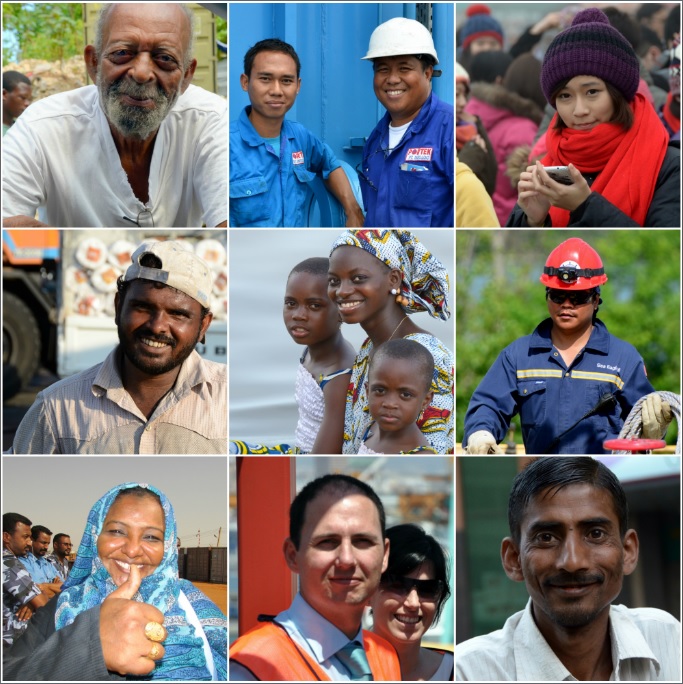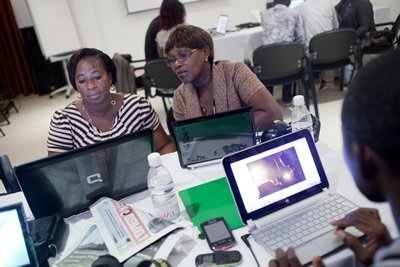The year 2017 was a busy one for UNCTAD as the implementation of the previous year’s Nairobi Maafikiano picked up pace. Here is a glimpse of just some of the things UNCTAD got up to during 2017.
JANUARY
At the start of January, Sudan became the first country to complete UNCTAD’s Empowerment Programme for National Trade Facilitation Committees. It should help the nation move goods across borders more smoothly, including such products as cotton, gum arabic, sesame, groundnuts, hibiscus flowers, senna pods, livestock, meat, vegetables and fruits, and hides and skins.
Later in the month, UNCTAD Secretary-General Mukhisa Kituyi attended the World Economic Forum in Davos, Switzerland, to tell global influencers that a “model of trade that leaves too many people behind is not a sustainable model of inclusive prosperity”.
With the imminent entry into force of the World Trade Organization’s Trade Facilitation Agreement – which eventually came on 22 February when the threshold of national ratification by two-thirds of the WTO’s 164 members was passed – UNCTAD intensified its work supporting developing countries to comply with its terms.
UNCTAD’s long-standing expertise and experience in trade facilitation includes aiding the establishment of national trade and transport facilitation committees, gap analysis needs assessments, trade facilitation roadmaps, transit agreements and customs automation through its Automated System for Customs Data (ASYCUDA), programme as well as trade portals.

UNCTAD services launched at the beginning of 2017 included a new multilingual version of the UN Online Repository for National Trade Facilitation Bodies, as well as the first International Forum for National Trade Facilitation Committees organized in cooperation with other international bodies, on 23–27 January.
Meanwhile, participants at an inter-sessional meeting of the UN's Commission on Science and Technology for Development, convened by UNCTAD in Geneva on 23–25 January, asked: “What has innovation got to do with reducing poverty?”
Among those providing answers were world-class experts like Jaideep Prabhu, with his focus on “frugal” or “jugaad” innovation, Gillian Marcelle, who discussed mixing and matching traditional and non-traditional sources of innovation and investment, Ticora Jones, who links up universities and local communities looking to technology to address development challenges, Bingfang Wu, who runs a satellite sensing service to help developing countries predict crop yields to ensure secure sources of food, Dhesi Baha Raja, who thinks the power of machine learning can be used to forecast epidemics, and many, many others.
At the Economic and Social Council Youth Forum, held at the United Nations in New York on 30–31 January, UNCTAD Secretary-General Mukhisa Kituyi said “The international community must see youth not as objects, but as subjects and drivers of change that should not be sidelined from political processes”.
FEBRUARY
UNCTAD’s Global Investment Trends Monitor reported at the start of February that global flows of foreign direct investment had fallen by 13% in 2016 to an estimated $$1.52 trillion as global economic growth remained weak and world-trade volumes posted aenemic gains.
Later in the month UNCTAD reported that the value of global imports of information and communications technology (ICT) goods declined in 2015 by 3.6% in current prices to just over $2 trillion –the first such decline since 2009.
Communications equipment was the only category of finished ICT goods that continued to record positive growth. Global imports of such equipment exceeded those of computers and peripherals for a second consecutive year.
In developing countries, the trend was even more pronounced. For every dollar's worth of imported computers and peripherals, developing countries spent $1.5 on imported communication equipment.

This means that developing countries accounted for as much as 45% of global communications equipment imports in 2015. This share has been steadily increasing since the launch of smartphones in 2007.
Also in February, UNCTAD and UN Women announced they would join forces to provide advice and a framework that incorporate the gender dimension in models of growth and development, and in particular the effects of the unpaid "care economy".
MARCH
International Women’s Day on 8 March was marked by a reminder that the success of the 2030 Agenda for Sustainable Development rests on, among other things, deep and meaningful gender equality.
"Women's economic empowerment is a game-changer for development,” UNCTAD Secretary-General Mukhisa Kituyi said. “We should leave no one behind in the 2030 Agenda."
Simone Nadège Assah Kuete, an officer with Cameroon's Ministry of Trade who has worked with UNCTAD's Virtual Institute, and its Trade, Gender and Development Programme, added that polices aimed at opening a country's economy to trade need to be coupled with policies aimed at resolving the daily constraints that women face in the economy, in particular the lack of access to land, capital and technical skills training. Her message was underscored by the fact that 89 researchers, government officials, UN staff and civil society representatives, including 58 women and 31 men from 55 countries, had successfully completed the third edition of the UNCTAD online course on trade and gender, held from 9 January–26 February.

"The course not only has enriched my knowledge, but also provided with many evidence-based cases on how trade influences women differently in different countries,” participant Galyna Meshcheryakova, a gender expert at the Canada-Ukraine Trade and Investment Support Project, said. “The information helped very much to prepare a training course for representatives of the Ministry of Economic Development and Trade of Ukraine about application of gender-based analysis for commodity selection for export."
Dr. Kituyi hammered home the message ahead of the opening in New York of the Sixty-first United Nations Commission on the Status of Women, which took place from 13–24 March. He said that trade policies that don’t have a gender perspective can inadvertently undermine women's economic empowerment.
World Consumer Rights Day on 15 March provided an excellent opportunity to showcase UNCTAD’s continued work on setting the agenda for consumer rights in the digital era.
UNCTAD, in cooperation with Egypt’s Ministry for Communications and Information Technology, developed a new national e-commerce strategy which was presented to Minister of Communications and Information Technology Eng Yasser ElKady on 7 March 2017 in Cairo.
"The strategy is a solid foundation for stimulating e-commerce in Egypt, and I'm looking forward to the strategy's execution," said Mr. ElKady said. "I really appreciate all the efforts and dedication by UNCTAD on this strategy.”
Also in March, UNCTAD and Vanuatu's Department of Industry reviewed the development of the Pacific nation’s’s green export action plan, which focusses on coconuts, cocoa and sandalwood, during a one-day workshop in Port Vila.
During the Oceans Forum held in Geneva on 21–22 March, Awni Behnam, the honorary president of the International Ocean Institute, and Antonella Vassallo, its managing director, explained the danger that plastic pollution poses to our seas. And Anna Holl-Buhl, a policy advisor for fisheries for the World Wide Fund For Nature, underlined the importance of small-scale artisanal fishers to marine resources and markets.


